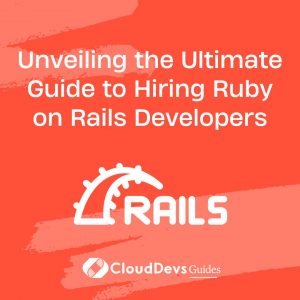Unveiling the Ultimate Guide to Hiring Ruby on Rails Developers
Ruby on Rails (RoR), a dynamic web development framework, has revolutionized the way web applications are built. To bring your projects to life, hiring skilled Ruby on Rails developers is vital. This guide is your compass through the hiring process, empowering you to evaluate candidates’ technical prowess, problem-solving skills, and RoR expertise. Let’s embark on this journey, uncovering the essential interview questions and strategies to identify the perfect Ruby on Rails developer for your team.
Table of Contents
1. How to Hire Ruby on Rails Developers
Embarking on the journey to hire Ruby on Rails developers? These steps will guide your success:
- Job Requirements: Define specific job requirements, outlining the skills and experience you seek.
- Search Channels: Utilize job postings, online platforms, and tech communities to uncover potential candidates.
- Screening: Scrutinize candidates’ Ruby on Rails expertise, relevant experience, and additional skills.
- Technical Assessment: Devise a comprehensive technical assessment to evaluate coding abilities and problem-solving aptitude.
2. Core Skills of Ruby on Rails Developers to Look For
When assessing Ruby on Rails developers, keep an eye out for these pivotal skills:
- Ruby Proficiency: A solid grasp of Ruby syntax, conventions, and object-oriented principles.
- Rails Framework Knowledge: Experience building and maintaining web applications using Ruby on Rails.
- Database Management: Proficiency in working with databases, SQL, and ActiveRecord for data modeling and querying.
- Front-End Proficiency: Familiarity with front-end technologies like HTML, CSS, and JavaScript.
- Testing Expertise: Experience with testing frameworks like RSpec or MiniTest and the ability to write effective tests.
- Problem-Solving Skills: Adeptness in breaking down complex problems and devising elegant solutions.
- Clean Code Practices: Commitment to writing clean, maintainable, and readable code.
3. Overview of the Ruby on Rails Developer Hiring Process
Here’s a bird’s-eye view of the Ruby on Rails developer hiring process:
3.1 Defining Job Requirements and Skillsets
Lay the foundation by outlining clear job prerequisites, specifying the skills and knowledge you’re seeking.
3.2 Crafting Compelling Job Descriptions
Create enticing job descriptions that accurately reflect the role, magnetizing the right candidates.
3.3 Crafting Ruby on Rails Developer Interview Questions
Develop a comprehensive set of interview questions covering Ruby on Rails intricacies, problem-solving acumen, and relevant technologies.
4. Sample Ruby on Rails Developer Interview Questions and Answers
Delve into these sample questions accompanied by detailed answers to assess candidates’ Ruby on Rails skills:
Q1. Explain the Model-View-Controller (MVC) architecture in Ruby on Rails and how it works.
A: MVC is a design pattern where the application is divided into three components: Model (data), View (presentation), and Controller (logic). In RoR, models represent data, views handle the UI, and controllers manage interactions.
Q2. Write a Ruby on Rails migration to add a new column called “location” to the “events” table.
class AddLocationToEvents < ActiveRecord::Migration[6.1]
def change
add_column :events, :location, :string
end
end
Q3. What is the purpose of ActiveRecord in Ruby on Rails, and how does it relate to databases?
A: ActiveRecord is RoR’s Object-Relational Mapping (ORM) tool. It simplifies database interactions by allowing developers to manipulate database records using Ruby classes and methods.
Q4. Explain the concept of “partials” in Ruby on Rails and how they enhance code modularity.
A: Partials are reusable snippets of view code. They enhance code modularity by allowing you to encapsulate repetitive view code and render it within different views.
Q5. How do you create a form for creating a new record in Ruby on Rails using the form_for helper?
<%= form_for @article do |f| %> <%= f.label :title %> <%= f.text_field :title %> <%= f.label :content %> <%= f.text_area :content %> <%= f.submit %> <% end %>
Q6. Describe the purpose of Rails migrations and why they are beneficial.
A: Rails migrations are scripts that manage database schema changes over time. They provide a version-controlled and repeatable way to alter the database structure while preserving data.
Q7. Write a Ruby on Rails route that maps the URL “/articles” to the “index” action of the “ArticlesController”.
get '/articles', to: 'articles#index'
Q8. How do you create a new record in the database using Ruby on Rails’ ActiveRecord?
article = Article.new(title: 'Sample Title', content: 'Sample Content') article.save
Q9. Explain the purpose of the “before_action” filter in Ruby on Rails controllers and provide an example.
A: The “before_action” filter allows you to execute a method before specific controller actions. For instance:
class ArticlesController < ApplicationController before_action :authenticate_user, except: [:index, :show] # Rest of the controller actions end
Q10. What is the role of the Gemfile in Ruby on Rails projects, and how do you install gems defined in it?
A: The Gemfile lists the project’s dependencies (gems). To install gems, use the “bundle install” command.
5. How to Hire Ruby on Rails Developers through CloudDevs
CloudDevs is your partner in simplifying the process of hiring accomplished Ruby on Rails developers:
Step 1: Connect with CloudDevs: Initiate a dialogue with a CloudDevs consultant to discuss your project’s specifics, desired skills, and anticipated experience.
Step 2: Discover the Perfect Match: Within 24 hours, CloudDevs will present you with a curated roster of pre-screened Ruby on Rails developers. Examine their profiles and select the developer aligned with your project’s vision.
Step 3: Launch a No-Risk Trial: Engage in discussions with your chosen developer to ensure seamless onboarding. Once content, formalize the collaboration and embark on a week-long free trial.
Leveraging the prowess of CloudDevs, you can effortlessly identify and engage top-tier Ruby on Rails developers, ensuring your team boasts the vital skills required to craft remarkable web applications.
Conclusion
By immersing yourself in the insights shared within this comprehensive guide and utilizing the detailed interview questions, you’re primed to expertly evaluate the capabilities of Ruby on Rails developers. Whether you’re crafting sophisticated web applications or pioneering digital platforms, securing the right Ruby on Rails developers for your team is the keystone to your project’s
Table of Contents






